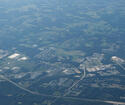No state advertises its egalitarian bona fides more than California. Governor Gavin Newsom brags that his state is “the envy of the world,” a place that is “not going to abandon our poor people.” In his inauguration speech, he claimed that “unlike the Washington plutocracy, California isn’t satisfied serving a powerful few on one side of the velvet rope. The California Dream is for all.” read more »
Demographics
Studs Terkel's Working, 50 Years On
As I prepared to teach my module on work this year, I realised that Studs Terkel’s book Working celebrates its fiftieth anniversary in 2022. It’s a book that both reflects and helps to explain working-class life. read more »
- Login to post comments
Understanding the Nordic Work Ethic
Over a hundred years ago, Max Weber observed that countries in northern Europe tended to have a higher standard of living and generally more well-functioning societies than countries in other parts of Europe. He believed that the reason for the formers’ success lay in their Protestant work ethic. read more »
Toronto Solidifies Highest Density Ranking in North America
Toronto seems guaranteed to retain its position as the densest urban area in North America (Canada and the United States), based on 2021 Census data recently released by Statistics Canada. The Toronto population centre (urban area) has grown at a rate of 0.8% annually since the 2016 census, while increasing its urban density to 3,088 persons per square kilometer. read more »
- Login to post comments
Does California Know What Time it Is?
Has the California proposition changed fundamentally? And does it matter for real estate?
The answer to the first question is yes—the state had a net population decline in 2021, the first drop since it began annual counts more than a century ago. read more »
- Login to post comments
Exurbia Rising
Perhaps nowhere is the gap between America’s cognitive elite and its populace larger than in their preferred urban forms. For nearly a century—interrupted only by the Depression and the Second World War—Americans have been heading further from the urban core, seeking affordable and safe communities with good schools, parks, and a generally more tranquil lifestyle. read more »
- Login to post comments
Domestic Migration 2010-2020: Flocking to Affordability
Some metropolitan areas continue to have higher costs of living relative to the national average. The most important component is the extent to which higher housing costs contribute to these differences. Our Urban Reform Institute Standard of Living Index showed that more than 85% of the difference between costs in the more expensive metropolitan areas and the nation was attributable to housing (Figure 1). read more »
- Login to post comments
The Evolving Geography of Opportunity: Leading Cities of the Past, Present, and Future
Cities which rise up as centers of prosperity and opportunity are places that ensure an emphasis on learning and innovation, a culture of openness to newcomers and unorthodox ideas, a favorable environment for commerce, a relatively good quality of life for residents, and a strong sense of shared community. The geography of opportunity is always evolving, as some cities emerge as centers of opportunity while others decline, with enormous consequences for people, places, and, indeed, civilizations. read more »
- Login to post comments
Canada: Suburbs Dominate Growth - 2021 Census
Canada has released early results of the 2021 Census, with a detailed analysis of growth in Census Metropolitan Areas (CMAs). Among the 41 metropolitan areas, 77% of the population growth between the 2016 and 2021 censuses was in the suburbs, with 23% in the urban core (Figure 1). The suburbs have 78.5% of the total CMA population, with 21.5% in the urban core (Figure 2) read more »
- Login to post comments
Are We Really Among the Wealthiest People on the Planet?
There are lots of ways of measuring how New Zealand is doing, and none of them is perfect.
We stack up very well on measures like life expectancy, unemployment, infant mortality, and car ownership. read more »
- Login to post comments






















